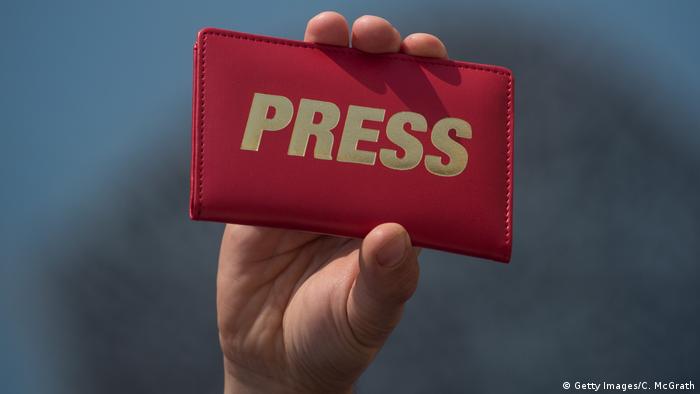Intimidation, imprisonment or even death are growing threats to journalists in Europe today, new data from 2019 has shown. Over 30 journalists were assaulted in Europe last year, and over 100 are currently behind bars.

Freedom of the press in Europe is facing increasingly greater threats, according to new data released Wednesday showing that intimidation is a growing trend.
"The condition of media freedom in Europe today is deeply unsatisfying," wrote the authors of a report published by the Council of Europe's Platform to promote the protection of journalism and safety of journalists. There is "a growing trend of intimidating journalists into staying silent," the report said.
The report analyzed alerts registered in 2019 with the platform, which is run by the Council in conjunction with 14 international press freedom groups and journalists' organizations as a way to process and share information on threats to media freedom in Europe.
Threats of deadly violence in Europe
The platform recorded 142 serious threats to press freedom in Europe last year, including 33 instances of journalists being physically attacked, 17 new cases of detention or imprisonment, 43 instances of harassment and intimidation and two cases of impunity for murder.
"Attacks, intimidations and persecutions of journalists are increasing during elections, referendums and other important political events," the authors wrote.
The report also referenced the deaths of two journalists in 2019: Irish journalist Lyra McKee, who was killed during riots in Northern Ireland, and Ukrainian journalist Wadim Komarow, who died after being beaten outside of his home in central Ukraine.
At the end of 2019, at least 105 journalists were being held behind bars in Turkey, Azerbaijan, Russia and Russian-controlled Ukrainian territory of Crimea, the report said.
In particular, the report called out Russia and Turkey as well EU member states Hungary, Poland, Malta, Bulgaria and France for questionable behavior in terms of press freedom.
Read more: How a journalist's murder haunts Malta's ruling elite
The problem with state-run media
The nationalization of media is also problematic in countries that regularly experience violations to their constitutions, which often leads to the harassment of journalists, the report said. In Bulgaria, for example, a large share of the country's newspapers are "under the control of a single conglomerate, which belongs to a politician."
The text also cited the 2017 death of Maltese journalist Daphne Caruana Galizia, a case in which prominent national authorities were implicated.
France, as well, saw an uptick last year in violence against journalists that reported on anti-government protests, the report said.
"Many journalists have become victims of intimidation and attacks from security authorities," the report said, adding that the use of tear gas and rubber bullets contributed to the problem.
The authors called on European decision-makers to use the figures as a "wake-up" call to act and provide greater support for journalists in Europe.
DW sends out a daily selection of the day's news and features. Sign up here.
DW RECOMMENDS
2 journalists were murdered — but their investigations live on
Teams of journalists came together after the murders of Jan Kuciak and Daphne Caruana Galizia to ensure their investigations were completed and published. The resulting articles are having lasting effects. (07.04.2019)
More journalists killed globally in 2018, report says
A report from Reporters Without Borders said journalist deaths rose by 8 percent this year. Hatred whipped up by "unscrupulous politicians" contributed to the increase, the organization said. (18.12.2018)
Date 29.04.2020
Author Kristie Pladson
No comments:
Post a Comment